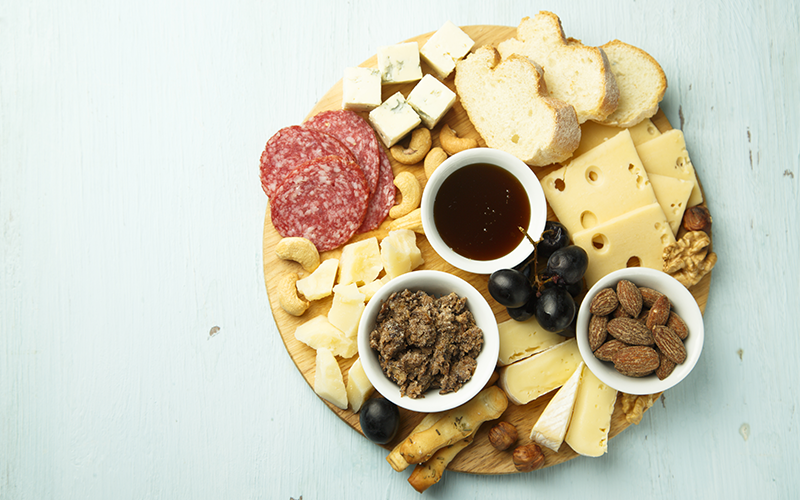
As a parent of a young athlete, you’re likely going to be on snack duty at some point during the season. For some competitions or practices, this will be easier: a few granola bars, orange slices, and you’re good to go. But for longer days, like track and field meets or regional matches that involve travel, warm-ups, and post-game awards ceremonies before heading home, you may be asked to provide meals or snacks to keep athletes satiated from breakfast to dinner. Here are a few foods to avoid bringing — and what to bring instead.
Avoid – Only simple carbohydrates
Kids who are participating in all-day events need a steady intake of carbohydrates, as well as proteins and fats, throughout the day. Often, parents on snack duty think about energy and then bring ultra-processed gummies, granola bars, cookies, and pastries. While small amounts of low-fat versions of these can be useful in between races and in the middle of games, all-day events require snacks with proteins and fats to keep athletes satiated and avoid blood sugar spikes and drops.
Instead: Plan out the day’s meals around when athletes are going to be working the hardest. In the hour before competition, prioritize simple carbohydrates with easy-to-eat snacks like granola bars, fresh/dried fruit, or fruit juice. For track and field meets where there are multiple races throughout the day, post-race snacks should focus on carbohydrates but include protein as well. Here, chocolate milk is a great option. To properly fuel athletes a couple hours before competition or after events, try larger snacks like almond butter and jam on whole wheat bread or a yogurt parfait with granola and berries.
Avoid – Anything caffeinated
Teens are more sensitive to caffeine than adults, so while your cup of coffee or soda at the game may keep you awake during the slower moments, it can have a negative impact on your young athlete. Caffeine can make kids jittery, exacerbate nerves, and lead to an energy crash that impacts their performance. Caffeine can also lead to dehydration. More specifically, most energy drinks don’t contain appropriate electrolytes, so sipping one can leave your athlete depleted after a long day, especially in hot weather.
Instead: Make your own sports drink! Find a single-ingredient fruit juice and dilute it down to 50 percent water and 50 percent juice. Then add a pinch of sea salt and a small spoonful of honey for a natural sports drink that won’t have athletes crashing on the field.
Avoid – Fatty snacks
Pepperoni and beef jerky may sound like protein-filled, tasty treats, but on game days, these high fat and highly processed snacks are going to negatively impact your athlete. They’re hard to digest and can lead to gastric distress in athletes, especially during harder efforts, and they won’t effectively fuel athletes as their glycogen stores drop throughout the day.
Instead: Save the jerky for post-game and opt for easier to digest finger food like pretzels, granola bars, any type of fresh or dried fruit, or low-fat crackers while the competition is going on.
Avoid – Obvious Allergies
More than 6 million children in the U.S. have a food allergy, according to the American College of Allergies, Asthma and Immunology. A whopping 2.5 percent of children have peanut allergies, lactose intolerance is the second most common allergy for children, and gluten sensitivities are also on the rise. Ask ahead of time if any athletes have allergies and you can even check with your school or sports association since there may be some rules in place for what you can and can’t bring.
Instead: Almonds are less likely to provoke an allergic reaction, so after checking with the team, try swapping almonds for peanuts to get athletes vitamin E and iron, as well as healthy fats. If you’re bringing milk products, such as chocolate milk, make sure you have a lactose-free option.
Avoid – Heavy desserts
While the occasional cupcake celebration is great, it’s better to model healthier eating practices for kids after exercise. This isn’t necessarily a nutritional mandate, but it is a good way to showcase that rewards for exercise or a job well done don’t need to be food-based. Too often, parents use treats like ice cream or cake to signal that a child has done something good, which can lead to a negative relationship with food later in life.
Instead: Consider the slightly healthier option of muffins with fruit and vegetables mixed in, such as a carrot cake muffin with actual chunks of carrot, pineapple, and raisin. And skip the frosting.
Avoid – Anything messy
For obvious reasons, your child’s coach would prefer that you save the sloppy joes for times when athletes aren’t in uniform!
Instead: Stick to options that come with their own wrapping, such as a paper-wrapped bean and rice burrito with minimal sauce to prevent dripping. And always bring a roll of paper towels.
Takeaway
Properly fueling athletes for competition, especially all-day or all-weekend events, is no easy task, but there are some basic guidelines to help make the decision-making process a little easier. In general, stick to foods with minimal ingredients and a balance of carbohydrates, proteins, and some healthy fats.
